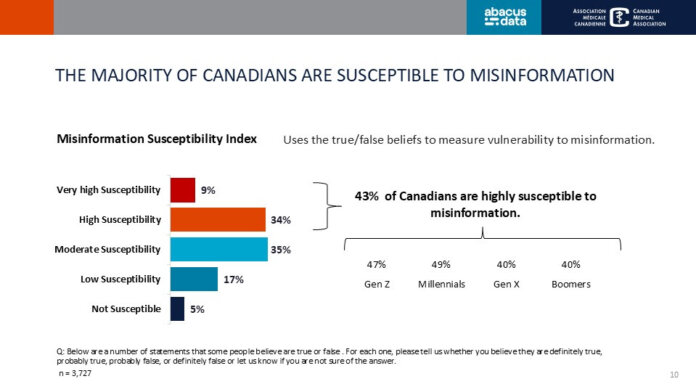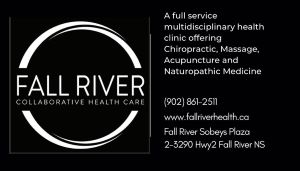The following is a story from polling data as supplied by Abacus Data
OTTAWA, ONT.: More Canadians are encountering health misinformation, according to a new survey, and the trend is having direct consequences on health outcomes.
The 2025 Health and Media Tracking Survey Opens in a new window, commissioned by the Canadian Medical Association (CMA) and delivered by Abacus Data, asked respondents to spot misinformation among several health-related statements.
It found that 43% of Canadians are highly susceptible to believing misinformation, while another 35% are moderately susceptible.
The repercussions of misinformation are even more concerning.
ADVERTISEMENT:
The survey points to a direct link between misinformation and negative health outcomes – and it’s a growing problem.
In this year’s survey, more than one-third of Canadians (35%) say they avoided effective health treatments due to false information, up six percentage points from 2024.
An increasing number of Canadians (43%) also say they are experiencing mental distress or increased anxiety due to misinformation.
Health misinformation has real consequences
- 37% of Canadians say poor access to health care and information has led them to trying medical advice found online
- 31% have taken medical advice found online instead of advice received from a medical professional
- 23% have had an adverse reaction or negative health impact from following health advice found online
ADVERTISEMENT:
Trust in physicians
Canadians continue to place the highest trust in physicians and other health care professionals to provide quality health information. Year-over-year trust in physicians remains stable at 80%.
The survey confirms a majority of Canadians report that seeing trusted health information leaves them better informed and equipped to counter rising misinformation.
How the CMA is working to combat health misinformation
This year’s survey found that an increasing number of Canadians (40%, up 3% from 2024) believe health associations and groups representing health professionals are among the best positioned to provide protection from health misinformation, alongside governments.
And the CMA is doing just that.
ADVERTISEMENT:
The CMA is committed to supporting improvements in the quality and quantity of accurate and accessible health and health system information in Canada.
That includes the commitment to annual tracking research, providing stable funding for health journalism and supporting medical advocates and experts who share credible information.
The CMA is also helping Canadians make sense of key issues in health care with initiatives such as Healthcare For Real.
The Abacus/CMA survey was conducted online with 3,727 Canadians (including an oversample of Gen Z and French respondents) from Nov. 12–19, 2024, in both official languages. The margin of error is +/- 1.96%, 19 times out of 20.































